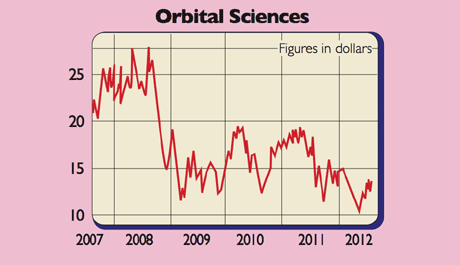The next race to the moon begins
Fifty years ago man landed on the moon – a remarkable technological achievement that seemed to portend great changes. Those transformations didn’t come. They might yet, says Simon Wilson.
Get the latest financial news, insights and expert analysis from our award-winning MoneyWeek team, to help you understand what really matters when it comes to your finances.
You are now subscribed
Your newsletter sign-up was successful
Want to add more newsletters?

Twice daily
MoneyWeek
Get the latest financial news, insights and expert analysis from our award-winning MoneyWeek team, to help you understand what really matters when it comes to your finances.

Four times a week
Look After My Bills
Sign up to our free money-saving newsletter, filled with the latest news and expert advice to help you find the best tips and deals for managing your bills. Start saving today!
What did the Apollo programme cost?
Far more than any government would think of spending on space exploration today. The Apollo programme, which ran from 1961 to 1972 , and achieved its goal of putting astronauts on the moon for the first time, cost around $200bn in today's money. By 1967, the programme was consuming an astonishing 4.4% of the entire US federal budget. That's marginally less than the UK currently spends on its entire defence budget. And it's vastly more than the 0.5% of its budget that the US spends on its national space agency now. That 1960s spend, of course, was part of the Cold War space race: putting two men on the moon in July 1969 was a great show of American power after the Soviet Union sent the first man into space in 1961. It captivated the imagination of 600 million people watching on television, and appeared to be, as Neil Armstrong observed, a "giant leap for mankind".
Was it a giant leap?
It remains one of our greatest technological feats. And five subsequent Apollo missions also landed astronauts on the moon. But since December 1972, when Apollo 17 returned home, no one has been back. Human ventures have been restricted to low Earth orbit, and in particular the International Space Station. David Parker of the European Space Agency draws a parallel with the race to reach the South Pole in the early 1900s.
What's the parallel?
There was an international competition to reach the South Pole and "then no one went back for 50 years", says Parker. Antarctica was finally opened up by technological advances relating to motorised vehicles, air transport and radio, which made the construction and operation of bases there possible. Equally, we are now approaching that stage with our exploitation of the moon. Advances in machine learning, sensor technology and robotics "promise to transform lunar colonisation", says Robert McKie in The Observer, by reducing the need for a continual human presence and making it cheaper.
MoneyWeek
Subscribe to MoneyWeek today and get your first six magazine issues absolutely FREE

Sign up to Money Morning
Don't miss the latest investment and personal finances news, market analysis, plus money-saving tips with our free twice-daily newsletter
Don't miss the latest investment and personal finances news, market analysis, plus money-saving tips with our free twice-daily newsletter
Who is leading the process?
Changing geopolitics a more assertive US, the rise of China and India is stoking a renewed push back to the moon. In the US, Nasa's Artemis programme, championed by President Trump, aims to install a manned space station in the moon's orbit and use it as a base for putting astronauts back on the moon by 2024. China plans to land people on the moon by 2035. India hopes to land a craft on the moon. But the role of private enterprise is growing fast too. Between 1958 and 2009, almost all of space spending was by state agencies. But in the past decade private investment has grown to $2bn a year, or 15% of the total. That growth is part of broader trends suggesting that the next 50 years of space exploration will look very different from the first.
How so?
Falling costs, emerging technologies, Chinese and Indian ambitions, and a new generation of entrepreneurs "promise a bold era of space development", says The Economist. The coming age will involve the maturing of two new commercial models that already exist: the big business of launching and maintaining swarms of communications satellites in low orbit; and the niche one of tourism for the rich. In the long run it might also involve mineral exploitation in the form of asteroid mining, and even mass transportation and colonisation. "It used to be a space race between countries, and now it's a space race between billionaires," says Anoop Menon, a professor at Wharton. Elon Musk is "running SpaceX with the goal of colonising Mars and making humanity a multi-planetary species". Richard Branson's Virgin Galactic plans to go public later this year, with a valuation of around $1.5bn.
How big is the space market overall?
According to estimates by Bank of America Merrill Lynch, the total size of the space-related market last year ranging from the manufacture and use of infrastructure, to space-enabled applications such as satellite phones and weather services was $339bn. UBS thinks annual revenues will be around $800bn by 2030. Merrill Lynch reckons that, due to rapid growth in satellite deployment, ancillary services and launch capabilities between now and 2045, the market will expand eightfold to $2.7trn, and produce "more advances in the next few decades than throughout human history".
What are the key areas?
In terms of the moon, Nasa is encouraging the growth of a network of private companies capable of transport and delivery such as Astrobotic, which announced a $79.5m contract with Nasa in May. The later, second phase of moon development will be an even bigger commercial opportunity, says Richard Waters in the Financial Times. If there is as much "frozen water at the moon's poles as many hope, it could... be separated into oxygen and hydrogen to make rocket propellant, turning the moon into a fuel stop for future missions to Mars". Mining precious metals left by asteroid strikes is also a potential bonanza.
Which firms could benefit?
In the space sector more broadly, a key current growth area is nanosatellites (launched into low-earth orbit, 500km-2,000km above Earth far below the 36,000km "geostationary" altitude of conventional communications satellites). Players include Rocket Lab, which has invested heavily in a launch site in New Zealand, Planet Labs, Fleet Space Technologies and Spire. Established names investing heavily in satellite broadband are Inmarsat, Viasat and OneWeb, a US-start-up backed by SoftBank and Virgin.
Get the latest financial news, insights and expert analysis from our award-winning MoneyWeek team, to help you understand what really matters when it comes to your finances.
-
 How a ‘great view’ from your home can boost its value by 35%
How a ‘great view’ from your home can boost its value by 35%A house that comes with a picturesque backdrop could add tens of thousands of pounds to its asking price – but how does each region compare?
-
 What is a care fees annuity and how much does it cost?
What is a care fees annuity and how much does it cost?How we will be cared for in our later years – and how much we are willing to pay for it – are conversations best had as early as possible. One option to cover the cost is a care fees annuity. We look at the pros and cons.
-
 The dawn of a new space age
The dawn of a new space ageBriefings Jostling to be the first billionaire in space might seem to be a daft ego trip, but it is all part of a broader space industry with important real-world applications.
-
The future of space exploration
Features The International Space Station is 20 years old. A robot has landed on Mars. Billionaire adventurers have set their sights on the stars. What next for humankind’s great space adventure?
-
 Make your fortune on the final frontier
Make your fortune on the final frontierFeatures The next great space race will be led by private companies – the rewards for investors could be astronomical, says Seán Keyes. Here, he tips two pioneering stocks to buy now.
-
Space: crossing the final frontier
Features It's been 40 years since man first landed on the moon. Now, Richard Branson and other buccaneers are paving the way for space tourism. Simon Wilson investigates whether it is yet a reality, and what the future holds for space exploration.